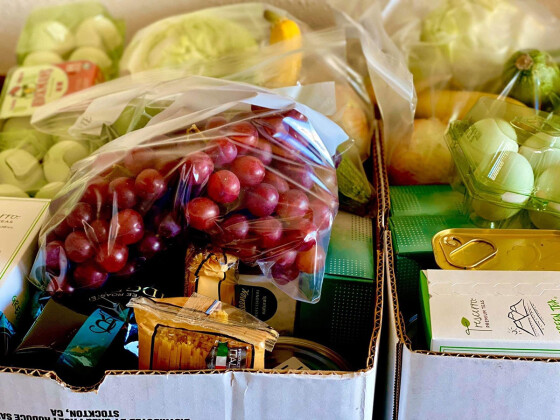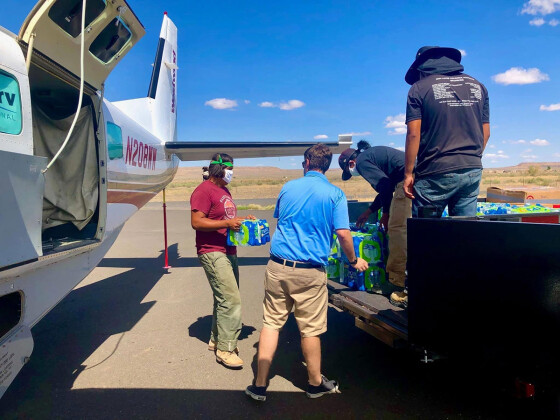Support from W.K. Kellogg Foundation Bolster Efforts
 TÓ NANEESDIZÍ, DINÉTAH (Tuba City, Navajo Nation – August 31, 2020) The Navajo and Hopi Families COVID-19 Relief Fund, an initiative of Yée Ha’óolníidóo (translates into “May the Navajo People Have Fortitude”), was awarded a $200,000 grant from the W.K. Kellogg Foundation. The support comes at a critical juncture for the organization. As the Navajo and Hopi communities settle into a new season of struggle against the virus, this support strengthens Yée Ha’óolníidóo to continue sustained relief efforts against the pandemic.
TÓ NANEESDIZÍ, DINÉTAH (Tuba City, Navajo Nation – August 31, 2020) The Navajo and Hopi Families COVID-19 Relief Fund, an initiative of Yée Ha’óolníidóo (translates into “May the Navajo People Have Fortitude”), was awarded a $200,000 grant from the W.K. Kellogg Foundation. The support comes at a critical juncture for the organization. As the Navajo and Hopi communities settle into a new season of struggle against the virus, this support strengthens Yée Ha’óolníidóo to continue sustained relief efforts against the pandemic.
“We are so thankful for this investment in further strengthening the grassroots response to COVID-19 in our communities, and also for the tremendous foresight in funding long-term, sustainable solutions to address the longstanding food insecurity in our Navajo and Hopi communities,” said Ethel Branch, Founder and Interim Executive Director for Yée Ha’óolníidóo.
When 12 women from the Navajo and Hopi nations began organizing to protect their communities from COVID-19 in March, they had no idea their effort would blossom into a relief fund of more than $5.8 million backed by nearly 93,000 supporters from around the world. Together, the team has trained roughly 160 volunteers in stringent health and safety protocols, and provided more than $2 million worth of food, cleaning supplies and personal protective equipment to over 23,665 vulnerable Navajo and Hopi families (and an estimated 94,660 individuals) in the midst of this pandemic.
“We are deeply appreciative of the commitment, love, and devotion of the women who organized swiftly to respond to community needs,” said Natasha K. Hale, Program Officer with the W.K. Kellogg Foundation. “This cadre of women have demonstrated leadership and loyalty to nation-building, and because of their knowledge of systems and close relationships with community leaders, they were best positioned to respond.”
Each family receives two weeks of high-quality fresh food, as well as water, masks, cleaning supplies, and other essential items. They also receive culturally-relevant COVID-19 educational materials, including in the Navajo language. Most recently Yée Ha’óolníidóo collaborated with Air Serv International to charter 24 flights to deliver 48,193 pounds of supplies to remote corners of the Navajo and Hopi nations.
The support from the Kellogg Foundation helps with capacity building and long-term planning for Yée Ha’óolníidóo, including transitioning the organization to having permanent staff and fixed distribution centers at multiple sites. This will provide stability for relief efforts and help prepare for future waves of COVID-19. The grant also supports the development of additional culturally-relevant educational material designed to flatten the curve on the two nations.
In an effort to lay the foundation for long-term food security on Navajo and Hopi, Yée Ha’óolníidóo will conduct a network and landscape analysis to identify partners in the local food and farmers market space, opportunities to strengthen agriculture and irrigation infrastructure, and seed bank partners with a focus on the distribution and preservation of traditional heirloom fruits and vegetables. “We are excited that the Kellogg Foundation is willing to invest in distinctly Diné and Hopi solutions to the food security challenge that our ancestors designed and refined over centuries, and that our elders and young farmers continue to implement today,” noted Branch.
Yée Há’óolníidóo continues to accept donations through GoFundMe and via checks made out to Nonprofit Fiscal Services (the organization’s new fiscal sponsor as of June 18). Please note in the subject line of the check that the donation is for Navajo/Hopi relief. Checks can be mailed to NFS at 623 East 2100 South, Suite B1, Salt Lake City, UT 84106.
About the W.K. Kellogg Foundation:
The W.K. Kellogg Foundation (WKKF), founded in 1930 as an independent, private foundation by breakfast cereal innovator and entrepreneur Will Keith Kellogg, is among the largest philanthropic foundations in the United States. Guided by the belief that all children should have an equal opportunity to thrive, WKKF works with communities to create conditions for vulnerable children so they can realize their full potential in school, work and life.





